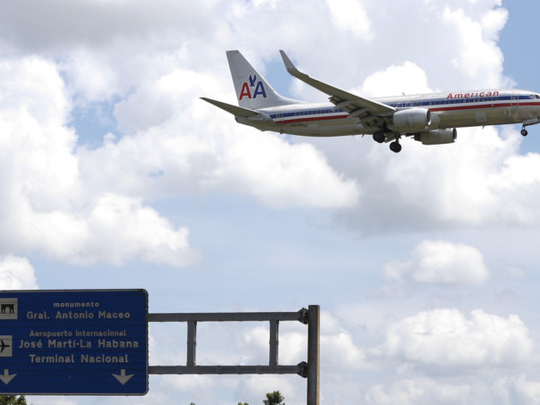
Dallas: This should be a great time to run the world’s largest airline. Profits are fat, travel demand is setting records, and Warren Buffett recently delivered a huge vote of confidence.
Instead, American Airlines is trailing the market again after a lacklustre 2016 and a 21 per cent drop in 2015. It abandoned part of a plan to eke out a few extra bucks by squeezing flyers into tighter spaces. Tough new security rules could be around the corner. And a lack of staffers in the Trump administration is impeding progress on a trade dispute with Arabian Gulf airlines.
But this time is different, says Doug Parker, American’s chief executive officer. Airlines have left behind “continuous boom and bust cycles where the busts were bigger than the boom.”
The challenge now is to win over investors and customers in an age when every misstep can be magnified on social media.
“The industry has been transformed,” he said in an interview Thursday at Bloomberg’s headquarters in New York. But “if you look at valuations, they don’t seem to reflect that view. If today’s earnings were believed to be sustainable, all of our valuations would be higher.”
American Airlines Group Inc’s stock price is about 10 times earnings per share for the last 12 months. That’s in line with rivals Delta Air Lines Inc and United Continental Holdings Inc. But it’s half the average of companies on the S&P Industrials Index.
American has advanced 4.5 per cent this year, compared with 9.5 per cent for industrial companies and a similar return for the broad S&P 500 Index. The airline fell less than 1 per cent to close at $48.79 Friday in New York.
Oil, debt
Some investors might be waiting to see if the industry survives a downturn without steep losses, Parker said. Rising oil prices and debt had been two big sources of trouble in the past. American hasn’t hedging its jet-fuel costs for several years. Parker says prices won’t get too much higher unless the US economy improves considerably. Moreover, stronger growth would benefit American by increasing travel demand, creating what the CEO sees as a natural hedge.
American has more debt than other carriers, but Parker says that’s partly because it has a younger fleet of planes. The Fort Worth, Texas-based carrier also has a bigger cash cushion than Delta or United to deal with nasty surprises.
The bottom line? American is positioned to earn $5 billion (Dh18.36 billion) annually before taxes in an average year, he said. In weak years, profits may drop to $3 billion without reverting to the crushing losses of the past, he said. The outlook is good enough for Buffett’s Berkshire Hathaway Inc. It took big stakes in American, Delta, United and Southwest Airlines Co. last year and now ranks among the top three holders of each carrier.
Laptop ban
Improving customer service remains a work in progress at American. So does winning over a workforce of 120,000 people, especially at a company with a long history of labour-management strife. That’s even more important at a time when airlines are under the microscope after a passenger was dragged off a United flight, sparking a public-relations debacle when video of the incident took social media by storm.
“The world has changed in the last few months for airlines,” Parker said. “We shouldn’t ignore that.”
Nor can it ignore potentially toughened security restrictions as the US government studies whether to expand a ban on in-flight laptops because of the risk of terrorist attacks. A prohibition already exists on US-bound flights from 10 airports in North Africa and the Middle East. The Department of Homeland Security is studying whether to extend those restrictions to Europe or even some international departures from the US.
“It’s not an easy task,” he said. “We’ll figure it all out but certainly what it requires is a level of screening that doesn’t exist today.”
Another priority: help from the US government and President Donald Trump on a trade dispute with three fast-growing Arabian Gulf airlines.
American, Delta and United are renewing efforts to win support for their request that the US hold talks to see if Qatar and the United Arab Emirates are violating Open Skies agreements and promoting unfair competition.
The US carriers argue that government funds from those countries are enabling Emirates, Etihad Airways and Qatar Airways Ltd to compete unfairly. A shortage of Trump administration staffers has stymied progress, Parker said.
“I think they share the concern,” he said. “I think it’s well known that in many cases, their ability to handle a wide number of things is constrained somewhat by their ability to have staff.”











